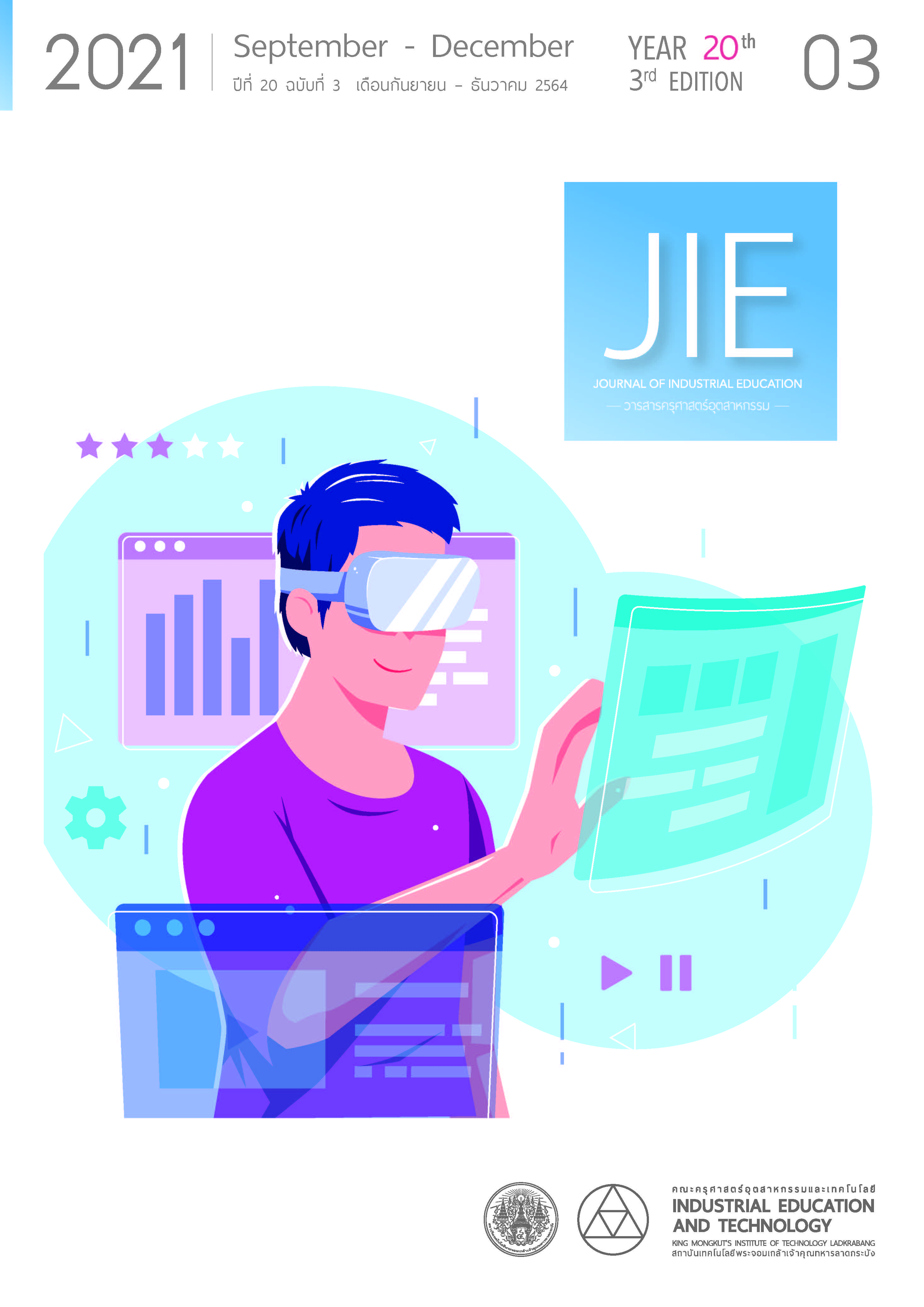การพัฒนาทักษะการพูดภาษาจีน โดยใช้กิจกรรมบทบาทสมมติ กรณีศึกษาจากวิทยาลัยนานาชาติ วิทยาเขตสุราษฎร์ธานี มหาวิทยาลัยสงขลานครินทร์
คำสำคัญ:
กิจกรรมบทบาทสมมติ, การพัฒนาทักษะการพูด, ภาษาจีน, ความพึงพอใจบทคัดย่อ
การวิจัยครั้งนี้มีวัตถุประสงค์หลักเพื่อศึกษาผลการสอนโดยใช้กิจกรรมบทบาทสมมติและความพึงพอใจของผู้เรียนที่มีต่อการเรียนภาษาจีนโดยใช้กิจกรรมบทบาทสมมติ กลุ่มตัวอย่าง คือ นักศึกษาหลักสูตรภาษาจีนเพื่อการสื่อสารทางธุรกิจ วิทยาลัยนานาชาติ วิทยาเขตสุราษฎร์ธานี จำนวน 70 คน ที่ลงทะเบียนเรียนในรายวิชาภาษาจีน 3 ในภาคการศึกษาที่ 1 ปีการศึกษา 2564 โดยวิธีการสุ่มตัวอย่างแบบเจาะจง เครื่องมือที่ใช้ในการวิจัยและเก็บรวบรวมข้อมูล คือ ชุดฝึกกิจกรรมบทบาทสมมติเพื่อพัฒนาทักษะการพูดภาษาจีน จำนวน 4 สถานการณ์ แบบทดสอบวัดทักษะการพูดภาษาจีนก่อนและหลังทำกิจกรรมบทบาทสมมติ แบบประเมินความพึงพอใจที่มีต่อการจัดการเรียนรู้โดยใช้กิจกรรมบทบาทสมมติ แบบสัมภาษณ์กึ่งมีโครงสร้าง สถิติที่ใช้วิเคราะห์ข้อมูล คือ ค่าเฉลี่ย () ค่าเบี่ยงเบนมาตรฐาน (S.D.) และสถิติ t-test dependent ผลการวิจัยพบว่า ทักษะการพูดภาษาจีนด้วยกิจกรรมบทบาทสมมติของผู้เรียนหลังเรียนสูงกว่าก่อนเรียนอย่างมีนัยสำคัญทางสถิติที่ระดับ .05 และผู้เรียนมีความพึงพอใจต่อการเรียนภาษาจีนโดยใช้กิจกรรมบทบาทสมมติโดยภาพรวมอยู่ในระดับมาก โดยมีค่าเฉลี่ยรวม (
) เท่ากับ 4.47
เอกสารอ้างอิง
Manomaivibool, P. (2007). “Development of Chinese language teaching in Thailand.” Journal of Letters. 36(2), 64-82. (in Thai)
Saejia, H. (2016). The development of Chinese teaching and learning system in Thailand: Primary school level. (Research report). Bangkok: Office of the Education Council. 13. (in Thai)
Wasinanon, N. (2016). The development of Chinese teaching and learning system in Thailand: Undergraduate level. (Research report). Bangkok: Office of the Education Council. 12-16. (in Thai)
Nuansri, A. (2015). “The communicative approach for learning Chinese with the total physical response (TPR) method for the Grade 4 students of way Khu-yang, Kampheng Phet Primary education area office 1.” Panyapiwat Journal. 7(1), 149-159. (in Thai)
Tatip, S., & Tanunchaibutra, P. (2016). “The development of Grade 9 students’ Korean language listening and speaking abilities using B-SLIM learning model together with role playing activities.” Journal of Education Khon Kaen University (Graduate Studies Research). 10(Special Issue), 135-140. (in Thai)
Tipmontree, S., & Tasanameelarp, A. (2019). “Using role playing activities to improve Thai EFL students’ oral English communication skills.” International Journal of Business and Society (IJBS). 21(3), 1215-1225.
Li, X., & Jongkonklang, S. (2017). “The development of learning unit on Chinese communication skills for Prathomsuksa 5 students of the Demonstration school of Nakhon Ratchasima Rajabhat university.” Ratchaphrurk Journal. 15(1), 104-111. (in Thai)
Theerawut, K. (2017). “A study of learning achievements and satisfaction towards 0109431 Chinese proverbial tales by using role-play method of the third year Chinese major students at Thaksin University.” Inthaninthaksin Journal. 12(3), 127-140. (in Thai)
Tasanameelarp, A., Girgin, T., Muangkaew, N., & Pengbun, C. (2017). “Students’ perceptions of English language teaching and learning in Prince of Songkla University, Surat Thani campus.” Journal of Mahasarakham University Humanities and Social Sciences. 36(2), 15-25. (in Thai)
Tasanameelarp, A. (2016). “Languages communication and business curriculum: aspects from students, lecturers, and employers.” Journal of Humanities and Social Sciences Mahasarakham University. 35(4), 219-228. (in Thai)
Srisa-ard, B. (2002). Basic Research. 7th ed. Bangkok: Suwiriyasarn. (in Thai)
Likert, R. (1932). “A technique for the measurement of attitudes.” Archives of Psychology. 22(140), 55.
Sungpanich, P. (2017). “Improving French speaking skills through the use of simulation technique of Tourism Industry students: Faculty of Management science at Chandrakasem Rajabhat University.” The Bulletin de l’ATPF. 40(2), 41-54. (in Thai)
Murphy, J. (2003). “Task-based learning: the interaction between tasks and learners.” ELT Journal. 57(4), 352-360.
Domesrifa, K. (2008). “A study of using oral communicative activities to enhance English speaking ability of Mattayomsuksa one students.” Master’s project, Srinakharinwirot University, 50-53. (in Thai)
Moontadee, S., Kunyot, T., & Wora-in, C. (2016). “Developing English speaking skills of Grade 11 students through role play activities.” Humanities and Social Sciences Journal of Graduate School, Pibulsongkram Rajabhat University. 10(1), 68-83. (in Thai)
Wisutsiri, Y., & Tasanameelarp, A. (2020). “The desirable characteristics of Chinese teachers as perceived by Prince of Songkla University, Surat Thani campus students.” Humanities and Social Sciences Journal, Ubon Ratchathani Rajabhat University. 12(1), 200-211. (in Thai)
Namthong, M., & Wisutsiri, Y. (2016). “The evaluation of the effectiveness of Chinese language teaching. In K. Suwanpimon (Ed.).” Proceeding of the 8th PKRU National Conference: Research and Innovation for Globalization, Phuket: Phuket Rajabhat University. (in Thai)
Boonphak, K. (2020). “Learning Management in the New Normal.” Journal of Industrial Education. 19(2), 1-6. (in Thai)
Tasanameelarp, A., & Girgin, T. (2020). “The use of role-play activities to reduce Thai EFL learners’ English speaking anxiety.” Udon Thani Rajhabhat University Journal of Humanities and Social Sciences. 9(1), 1-20. (in Thai)
Tipmontree, S. (2013). Effectiveness of role playing in an “English for hospitality services” classroom. (Research report). Surat Thani: Prince of Songkla University. 83-99. (in Thai)
ดาวน์โหลด
เผยแพร่แล้ว
รูปแบบการอ้างอิง
ฉบับ
ประเภทบทความ
สัญญาอนุญาต
ลิขสิทธิ์ (c) 2021 วารสารครุศาสตร์อุตสาหกรรม

อนุญาตภายใต้เงื่อนไข Creative Commons Attribution-NonCommercial-NoDerivatives 4.0 International License.
"ข้อคิดเห็น เนื้อหา รวมทั้งการใช้ภาษาในบทความถือเป็นความรับผิดชอบของผู้เขียน"



